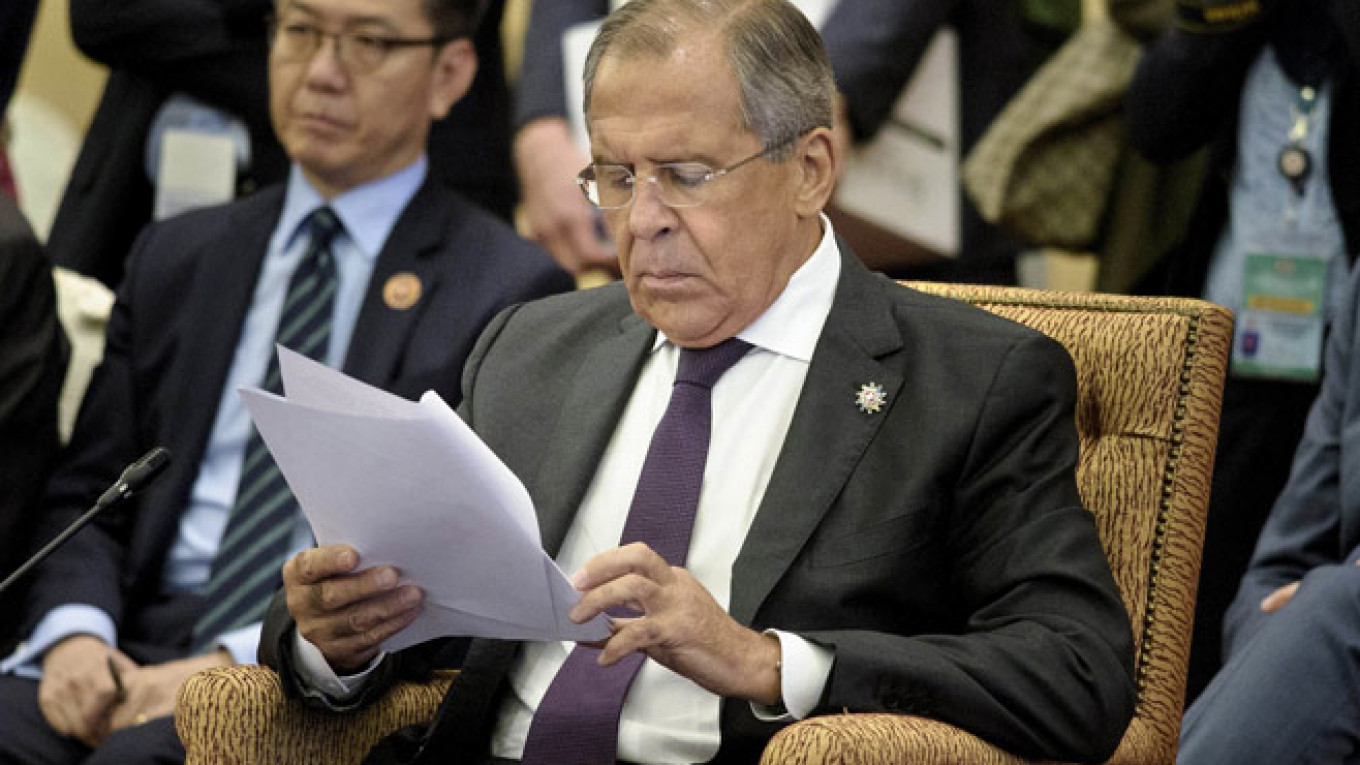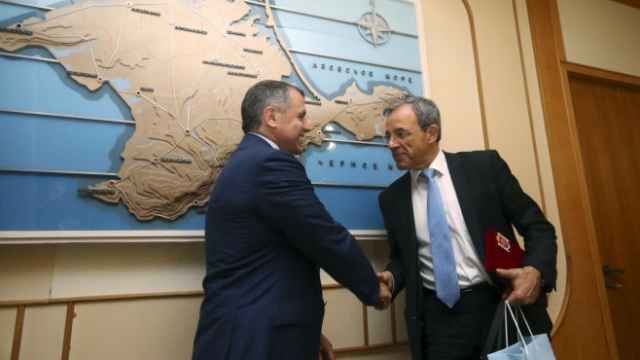This week the ruble continued on its downward spiral, hitting half-year lows against the dollar and euro. Hello, Iranian deal; hello, devalued yuan; hello, record oil surplus!
Even loyal Cossacks in St. Petersburg lost their nerve and began printing their own money — with Putin on it, of course — and plan to use the currency in Alaska when Russia reconquers it.
The government's retort was to revert to the best Soviet practices and begin planning limitations on livestock ownership. This would surely help struggling farmers — or maybe not. It was this brilliant move that allowed Soviet leader Nikita Khrushchev to destroy Soviet agriculture back in the 1960s, and there's no reason to think it won't work again.
It will be West's fault, of course. It always is — just check this week's headlines.
The New Diplomacy
Russian Foreign Minister Sergei Lavrov proved again that there's more to him than an old, grizzled diplomat. Mr. Nyet was captured on camera shaking his head and audibly muttering "f---ing morons" in Russian into a microphone during a news conference with his Saudi Arabian counterpart, Adel al-Jubeir.
The Foreign Ministry's new spokesperson Maria Zakharova said she did not hear a thing. Lavrov did not say anything else publicly, but we can all guess what he's really muttering at the moment. Many surmised that he was not addressing his esteemed Saudi colleague, but was speaking about some local journalists who were chattering loud enough to drown out the Saudi minister, which is, indeed, not nice.
Lavrov has acknowledged previously that he is skilled in the use of Russian expletives and as for English ones, we only have to remember his "Who are you to f---ing lecture me?" to then British Foreign Secretary David Miliband when tensions ran high during Russia's war with Georgia in 2008.
Diplomatic speak is indeed hellishly oblique, and it must be a relief to speak one's mind. So perhaps Lavrov is really a trailblazer, on track to ushering in a new era of international relations, when President Vladimir Putin and U.S. President Barack Obama can finally call each other "f---ing morons" to each other's faces, with the whole of the UN General Assembly watching and cheering. This way, reports from high-profile summits will finally be able to dethrone kittens on Buzzfeed.
It's a pity that Russians will never learn about Lavrov's achievement because all bad words are banned in the media, so the public has surely stopped using them all. So when the entire world embraces the "f---ing morons" diplomatic culture, Lavrov will have to stick to obsolete politeness — only venting when he is sure the microphone is off.
The Spies Question
Meanwhile, in the Yaroslavl region, a local engineer discovered an American spy. The spy was wearing the ultimate disguise — that of the engineer's drinking buddy. But the Yankee minion made one mistake, telling the Yaroslavl man that he had served in the Russian Navy and had traveled far and wide. The vigilant spy-watcher connected the dots, tied down the ex-sailor and beat him to death.
And well, what else would you expect? Foreign NGOs are described as "foreign agents" in Russia, foreign professors are fired as subversive elements, dual passport holders are a step away from wearing yellow stars, and Western leaders are essentially seen as man-eating lizard people. It figures that a foreign connection implies espionage by default.
It means you may very well be reading one of the final issues of The Moscow Times. But before our drinking buddies beat us to death, allow us to remind you that the problem is far bigger: 76 percent of Russians have never been abroad — but this means that 24 percent have.
Even if Turkey and Egypt are the main destinations for Russians, still — this means the travelers are NATO fiends and Islamic State sympathizers. That's quite a lot of spies and grassroots solutions like in Yaroslavl won't do — the Kremlin got the ball rolling on the foreigner witch-hunt, and now it needs the final solution to the spies question.
Perhaps Lavrov was reading this piece of news when he muttered his unspeakable phrase.
The Patriotic Bang
And in Moscow, translators of comic books — an art form finally taking root in Russia — pointed out another problem with the pesky Westerners: the "boom" and the "bang." All those noises in comic books are, naturally, in English, and usually just transliterated in Cyrillic translations.
Well, this is not patriotic enough (the translators said), so instead, Russia should draw on the languages of its numerous minorities — and use the likes of "wababai" (Dagestan) instead of "wow" and beautiful Mari words "galdyrdyms," "dubeldyms" and "tsingeldyms" to denote the sound of falling.
And this is delightful, of course — because apparently there is nothing unpatriotic, from a Russian chauvinist's point of view, if Captain America goes "galdyrdyms" on the vile Baron Wolfgang von Strucker, as long as it's "galdyrdyms" and not "bang." Even if "galdyrdyms" makes no more sense to most Russians than — well, say, than burning food or killing people that you suspect are spies because they've been to America.
Lavrov would have a few choice words to say about it. And no, it won't be "wababai."
Unfair Observer is the pen name of a Russian journalist that The Moscow Times has invited to observe the most brain-dead weekly developments in Russia.
A Message from The Moscow Times:
Dear readers,
We are facing unprecedented challenges. Russia's Prosecutor General's Office has designated The Moscow Times as an "undesirable" organization, criminalizing our work and putting our staff at risk of prosecution. This follows our earlier unjust labeling as a "foreign agent."
These actions are direct attempts to silence independent journalism in Russia. The authorities claim our work "discredits the decisions of the Russian leadership." We see things differently: we strive to provide accurate, unbiased reporting on Russia.
We, the journalists of The Moscow Times, refuse to be silenced. But to continue our work, we need your help.
Your support, no matter how small, makes a world of difference. If you can, please support us monthly starting from just $2. It's quick to set up, and every contribution makes a significant impact.
By supporting The Moscow Times, you're defending open, independent journalism in the face of repression. Thank you for standing with us.
Remind me later.






